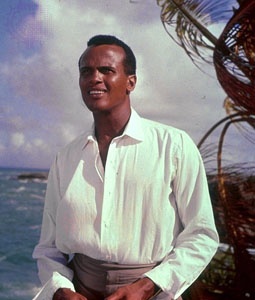Belafonte, Harry
American singer, actor, and activist
byname of Harold George Belafonte, Jr.
born March 1, 1927, New York, N.Y., U.S.
 American singer, who was a key figure in the 1950s popularity of folk music, and an actor and film producer as well.
American singer, who was a key figure in the 1950s popularity of folk music, and an actor and film producer as well.Belafonte's parents were emigrants from the Caribbean islands of Martinique and Jamaica, and he lived with his mother during her 1935–40 return to Jamaica. He left high school to serve in the U.S. Navy in the mid-1940s; after returning to New York City he studied drama at Erwin Piscator's Dramatic Workshop, where a singing role led to night-club engagements and a recording contract as a pop singer. In 1950 he became a folksinger, learning songs at the Library of Congress' American folk-song archives. He sang West Indian folk songs as well, in nightclubs and theatres; his handsome appearance added to his appeal as a frequent performer on television variety programs. With hit recordings such as “Day-O (Banana Boat Song)” and “Jamaica Farewell,” he initiated a fad for calypso music; in the mid-1950s his Harry Belafonte and Mark Twain and Other Folk Favorites were the first of his series of hit folk-song albums.
Belafonte was the male lead (but did not sing) in the film musical Carmen Jones (1954), a success that led to a starring role in the film Island in the Sun (1957). He also produced the film Odds Against Tomorrow (1959), in which he acted, and in the 1960s became the first African-American television producer. He helped introduce South African singer Miriam Makeba and Greek singer Nana Mouskouri to American audiences. A civil-rights activist, he was also active in charitable work. In the 1970s, when his singing career was a secondary occupation, he was featured in the films Buck and the Preacher (1972) and Uptown Saturday Night (1974).
- Surenas
- Surendranagar
- Suresnes
- surface-active agent
- surface analysis
- Surface area, volume, and average depth of oceans and seas
- surface coating
- surface hardening
- surface mining
- surface tension
- surfbird
- surfing
- surf music
- surfperch
- surge
- surgeonfish
- surgery
- Surgut
- Surigao
- Surin
- Surinach, Carlos
- Suriname
- Suriname, flag of
- Suriname River
- Surinam toad